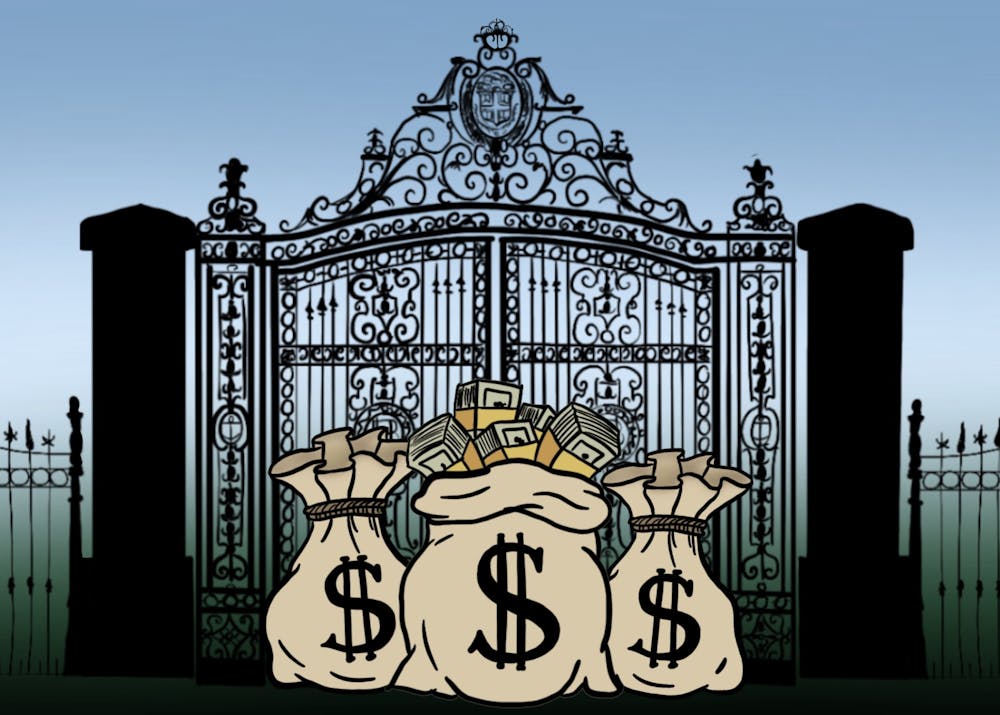Brown’s endowment is its $6.6 billion invested fund, entirely composed of donations and grown through investments.
The endowment is invested across a variety of stocks, real estate and other assets. As the value of these assets goes up, the endowment grows alongside it. Generally, endowments are designed so a fraction of their funds can be spent each year, while the rest is perpetually invested and grown.
The University says its endowment is made up of over 3,000 different accounts — each allocated for specific purposes like financial aid and salaries. The endowment's invested funds, worth $6.6 billion as of June 30, returned 2.7% over the last fiscal year. The total growth of the endowment, accounting for gifts and the endowment's contribution to Brown's operating budget, was 1.15%.
To learn more about the endowment’s performance this year, read our coverage.
Is an endowment the same thing as a budget?
Not exactly.
The endowment, for the most part, is separated from the University’s annual operating budget, which totaled around $1.69 billion for the current fiscal year, which began June 30.
The University routinely pulls money from its endowment to contribute to its operating budget. This fiscal year, it pulled out $277.8 million, or 4.8% of the endowment, according to a May 31 press release. The University aims to pull between 4.5% and 5.5% of its endowment for the budget every year, according to the release.
Who controls the endowment?
Brown’s 21-person Investment Office manages the endowment and is responsible for its year-by-year performance.
The Investment Office isn’t given complete control over the endowment. Instead, it reports to a separate Investment Committee that comprises 21 fellows and trustees of the Corporation, the University’s highest governing body. This Investment Committee is responsible for higher-level decisions including “asset allocation ranges, liquidity and risk guidelines,” according to the Investment Office’s website.
Performance-based compensation is common for investment management employees at Brown, University Spokesperson Brian Clark previously told The Herald.
Jane Dietze, the University’s chief investment officer, earned nearly $3 million in the 2021 calendar year — making her the University’s highest-paid employee that year — according to the University’s IRS Form 990 filings.
Have campus community members criticized the University’s investments?
Some students and faculty have called on the University to divest — or withdraw investments — from companies in its endowment with ties to Israel.
Earlier this year, the campus group Students for Justice in Palestine called on the University to withdraw investments in companies the group said are “profiting from Israeli apartheid” — a characterization used by Amnesty International and Human Rights Watch — The Herald previously reported.
And in 2020, The University’s Advisory Committee on Corporate Responsibility in Investment Policies recommended the University divest from “any company that profits from the Israeli occupation of Palestinian land,” The Herald previously reported.
Paxson did not bring the recommendation to the Brown Corporation, stating in a March 2021 letter that the endowment “should not be used as an instrument to take sides on contested geopolitical issues over which thoughtful and intelligent members of the Brown community vehemently disagree.”
Previously, calls to divest also centered on climate-related activism. A 2012 Herald op-ed by advocacy group Brown Divest Coal called on the University to divest from “the 15 coal companies with the worst environmental and social records.”
The op-ed was followed by rallies through 2013, though the Corporation decided not to divest from coal companies when its members met that October.
But in March 2020, the University pledged to divest entirely from fossil fuels in its endowment.
“To date, 90% of investments in companies that extract fossil fuels have been sold, and the remainder is being liquidated as it becomes possible to do so,” Paxson wrote in a March 2020 letter to the Brown community, The Herald previously reported.
Correction: A previous version of this article incorrectly referred to returns on the endowment's invested funds as the overall growth of the endowment. The Herald regrets the error.
Charlie Clynes was the managing editor of digital content on The Herald's 134th Editorial Board. Previously, he covered University Hall and the Graduate Labor Organization as a University News editor.

Neil Mehta was the editor-in-chief and president of the Brown Daily Herald's 134th editorial board. They study public health and statistics at Brown. Outside the office, you can find Neil baking and playing Tetris.





